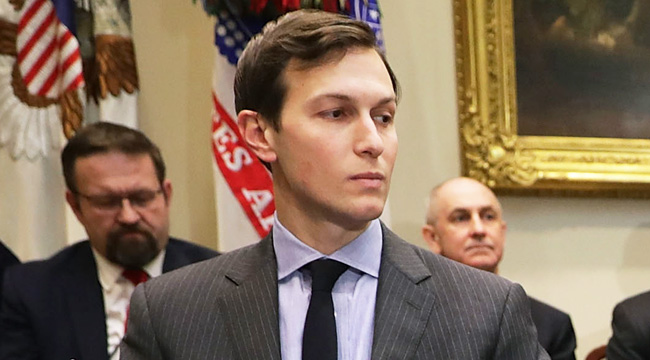
While the dust settled after the Trump administration launched 59 tomahawk missiles into a Syrian military air base, the New York Times dropped another report on Russia-Trump ties because that saga isn’t going away. Nope, sure not. This time around, Jared Kushner receives a feature role in a story that dredges up his sketchy meeting with the Russian ambassador during the Trump transition. Further, Kushner also met with Sergey Gorkov — a Vladimir Putin ally, Russian spy school grad, and head of a Russian state-owned bank (Vnesheconombank) that was placed under U.S. sanctions following Putin’s strong-arming in Ukraine and annexation of Crimea.
The NY Times revelation is quite serious. The paper details the forms that Kushner filled out while seeking top-secret security clearance. He was required to disclose every encounter he’d had (within seven years) with representatives of foreign governments, and you guessed it, Kushner did not mention either of these meetings with prominent Russians. His attorney, Jamie Gorelick, insists that her client simply submitted his form early (before it was completed?). Yet he did not disclose “dozens” of foreign contacts in addition to these Russian meetings, which …. is suspicious.
The paper’s sources claim “direct knowledge” of the situation, and apparently, Kushner promised to disclose more to the FBI once his omission was detected, but that never happened:
In a statement, Ms. Gorelick said that after learning of the error, Mr. Kushner told the F.B.I.: “During the presidential campaign and transition period, I served as a point-of-contact for foreign officials trying to reach the president-elect. I had numerous contacts with foreign officials in this capacity. … I would be happy to provide additional information about these contacts.” No names were disclosed in that correspondence.
Applicants for major national security positions must submit a lengthy F.B.I. questionnaire as part of a background check. They are asked to list the dates and details of all contacts with representatives of foreign governments.
Exactly how messy could this situation become? Kushner may have misrepresented or purposely withheld information on his SF-86 form, which would qualify as “falsifying or concealing material facts.” This offense is considered a federal felony and can land a defendant five years in prison and/or hefty fines. Yet as with Michael Flynn and the Logan Act, the possibility of prosecution for the offense would normally be considered rare.
However and with all of the ongoing investigations — within the FBI, the House, and Senate — the feds may want to make an example of someone. Kushner certainly risked losing his newly acquired top-secret clearance, but for now, he’s likely untouchable in the Trump administration. One thing is certain — Kushner shall soon testify in front of the Senate on Trump-Russia ties, and this disclosure form shall surely come up in hearings.
(Via New York Times)
